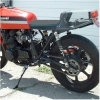- Posts: 436
- Thank you received: 64
Carb Stand from old carb holders.
- undiablo
-

- Offline
- User
loudhvx wrote: I think I've read Honda Twins manuals that have you sync carbs by looking at the RPM each carb can achieve on it's own. I know I've done it that way on twins for several years. That is a similar concept, but not useful on a four cylinder, since a four will not likely run on one cylinder without a drastic change on the throttle's idle position. (And of course, pulse timing can't be used on a non-360 crank twin.)
That is how I synch my Dnepr 650 boxer. However, user manual tells you to put the bike on the center stand. Warm the engine and put 4th gear. Note speed at the speedometer (no tachometer). Pull one lead cable from the spark plug (yes!); note the actual speed.
Connect that lead cable and disconnect the other one. Note actual speed.
Now synch the carbs until they both reach the same speed. The turn the idle speed to 800rpm.
Crazy uh?
Kawasaki KZ 750/4 LTD 1981
Kawasaki KLR 650 2011
Argentina - Buenos Aires
Please Log in or Create an account to join the conversation.
- NakedFun
-

- Offline
- User
- Posts: 1095
- Thank you received: 99
1. Most of the time if you are replacing the manifolds, they are probable pretty hard and cracked and not much fun to work with and get the carbs mounted.
2. Those of us who deal with numerous bikes, would benefit a method of grabbing numerous carb outlets and holding them. Maybe just a series of silicon hose adapters like used in forced induction tubing to a standard flange mounted on the stand?
Just seeing what people were doing there.
Cory
2008 Kawasaki Concours 14
1999 Kawasaki ZRX1100
1976 Kawasaki KZ900
Please Log in or Create an account to join the conversation.
- loudhvx
-
 Topic Author
Topic Author
- Offline
- KZr Legend
- Posts: 10864
- Thank you received: 1615
No, but since the issue of using vacuum syncing was brought up, I was addressing the shortcomings of using a vacuum sync on an engine that has one cylinder "out of whack", though I didn't use those exact words.NakedFun wrote: Last things I am going to say on the subject.
1. I nor anyone said we were taking the carbs off due to a cylinder performance issue. In fact this thread which is really out of control now, was about carb stands. Stands that are probable just used to service some carbs that need attention due to stale fuel, leaking gaskets, etc..,,
Yes, we agreed a bench sync is a good/necessary starting point. And I agree that some sort of vacuum rig could be made to bench sync the carbs. My point was that it probably won't be the final sync, especially on an engine in poor condition. But even on a good engine, you're going to want to check it on the engine, at least I would. So if I'm going to do that, I would just do a simple mechanical bench sync.NakedFun wrote: 2. I (now regrettably) mentioned that I have considered a stand with some means to draw a vacuum in the carbs. Why? When you completely rebuild most older carbs, there is a base line setting they get set to PRIOR to reinstallation and proper sync to the engine itself. The factory service manual will call out a very small dimensions that the center of the bottom edge of the slide should be from the bottom of the body inlet bore. You then use the adjustment to set them all at this point. Some will call this a bench top sync. I have a calibrated set of pin drills O use when I set this. This is simply so they are all as close to one another as they can be so you are not wasting time during the sync chase readings due to one being more open than another. I have thought a simple method would be to use vacuum at this point and baseline them as that is defining measure the factory is trying to get at with the measurement method.
Right, but you were addressing it to a comment I made about syncing an engine with one cylinder that was not in good running order. Here's my original quote.NakedFun wrote: 3. I have said repeatedly in this thread YOU STILL MUST SYNC to the ENGINE that is in good running order. This means all specs including valve clearance, leak down, blow by, etc is in serviceable range.
And by that, I later explained, I didn't mean the "only time a bench sync makes sense". I meant the only time it makes sense as the final sync, is when the engine is really bad. And for that purpose, I think making a bench-vac-sync would work well. Maybe you didn't notice that I was only referring to an engine that was in really poor condition, and thought I was saying a vacuum sync is not useful on a good running engine. By inference, you now seem to be agreeing with my original comment that started this conversation, so I can only conclude you misinterpreted my original point.The only time a bench sync makes sense is if the engine condition is really poor. When one or more cylinders are in worse condition than the others, vacuum syncing is not a good way to sync the carbs. It will result in you adjusting the carbs opposite of what the engine needs.
I thought I already covered this in the replay to the other member... I am defining "firing interval" as the elapsed time between two consecutive sparks. The interval I am talking about is the time elapsed between a spark on one cylinder and the spark on the next cylinder in the normal firing sequence. It could also be seen as the time from the beginning of one power stroke to the beginning of the next power stroke. Obviously if one cylinder, on its power stroke, applies a higher torque to the crankshaft than the other cylinders' power strokes, the crank's instantaneous speed, for that one stroke, will be faster than what the other cylinders produce on their power stroke. If the crank briefly turns faster from that one spark event to the next, the time elapsed from that spark to the next, must be shorter. If the time elapsed is shorter, then the firing interval, by definition, is shorter. I don't understand the confusion around this. (And I don't mean specifially you, as the other guy was also apparently disputing my definition, or usage of "interval", but he didn't really make clear what his dispute was relative to what I was saying.)NakedFun wrote: 4. The pulses you keep talking about, are timed by three things: ignition firing order, camshaft timing, and crank throw angles. Carbs do not change the firing interval or in simple terms, when each cylinder goes "boom". That uneasiness that you talk about is because one cylinder is firing improperly. What happens when it doesn't fire properly, you don't have the same amount of work or torque being output by that cylinder as compared to the others.
So if you make a tool to measure, at idle, the elapsed time between sparks, and one of those elapsed times (or "intervals") is shorter, you can infer that one cylinder is producing more power, or torque than the other cylinders. So you could then adjust that one carb accordingly to bring that one cylinder on par with the rest. This, then, would be another method for syncing carbs.
I agree.NakedFun wrote: 5. Most of the time ther are a great number of things that cause a rack of carbs to go out of sync. Sometimes it could be the intermediate linkages, a lot of times it is valve regression into the head causing valve clearance to go to tight. It may be cylinder wear, or even simple vacuum leaks like carb intakes. That is why it is scheduled maintenance....
Well, I do feel strongly, but that's not really the issue here. It's more that I don't really see what exactly the disagreement is on.NakedFun wrote: Listen, you obviously feel strongly about your ways of thinking about tuning an engine and that is great, but I for one am more interested in the tools that people are making to keep thes old bikes running. I am done with explaining the way I know and have learned through the years and in my profession. Thanks.
Cory
1981 KZ550 D1 gpz.
Kz550 valve train warning.
Other links.
Please Log in or Create an account to join the conversation.
- loudhvx
-
 Topic Author
Topic Author
- Offline
- KZr Legend
- Posts: 10864
- Thank you received: 1615
It is crazy, and yet works. I'll have to remember the speed thing on bikes without tachs.undiablo wrote:
loudhvx wrote: I think I've read Honda Twins manuals that have you sync carbs by looking at the RPM each carb can achieve on it's own. I know I've done it that way on twins for several years. That is a similar concept, but not useful on a four cylinder, since a four will not likely run on one cylinder without a drastic change on the throttle's idle position. (And of course, pulse timing can't be used on a non-360 crank twin.)
That is how I synch my Dnepr 650 boxer. However, user manual tells you to put the bike on the center stand. Warm the engine and put 4th gear. Note speed at the speedometer (no tachometer). Pull one lead cable from the spark plug (yes!); note the actual speed.
Connect that lead cable and disconnect the other one. Note actual speed.
Now synch the carbs until they both reach the same speed. The turn the idle speed to 800rpm.
Crazy uh?
1981 KZ550 D1 gpz.
Kz550 valve train warning.
Other links.
Please Log in or Create an account to join the conversation.
- loudhvx
-
 Topic Author
Topic Author
- Offline
- KZr Legend
- Posts: 10864
- Thank you received: 1615
I'd be grateful to know where the views differ exactly. I know Cory is a smart guy. He's been here a long time and I've read many of his posts and learned from them. I even like his idea of using vacuum to do a bench sync, especially on a motor with a bad cylinder or two.swest wrote: Two differing points of view on the same subject. lets move on.
Steve
I think it's just been a terminology miscommunication.
Anyway, doesn't the original poster get a say in where a thread is going? If so, I don't mind any thread of mine going in any technically related direction. I was bringing up the idea of using spark intervals to sync an engine because it occurred to me it would be much cheaper to make that as a solid-state syncing tool than the other one I made, here:
www.kzrider.com/forum/21-tools/569922-la...carb-synch-manometer
That one requires four expensive sensors. Using spark interval timing, I could do it with one sensor.
1981 KZ550 D1 gpz.
Kz550 valve train warning.
Other links.
Please Log in or Create an account to join the conversation.
- SWest
-

- Offline
- Sustaining Member
- 10 22 2014
- Posts: 23027
- Thank you received: 2758
Steve
Please Log in or Create an account to join the conversation.
- NakedFun
-

- Offline
- User
- Posts: 1095
- Thank you received: 99
loudhvx wrote: I'd be grateful to know where the views differ exactly. I know Cory is a smart guy. He's been here a long time and I've read many of his posts and learned from them.....
Actually most of the time I am an idiot!
Cory
2008 Kawasaki Concours 14
1999 Kawasaki ZRX1100
1976 Kawasaki KZ900
Please Log in or Create an account to join the conversation.
- strum
-

- Offline
- User
- Posts: 197
- Thank you received: 7
Blairsville Ga.
1980 KZ1000 Shaft (sold and missed already)
2003 ZRX 1200R (sold)
2003 Concours ZG1000 (just purchased)
Please Log in or Create an account to join the conversation.
- TexasKZ
-

- Offline
- Platinum Member
- Posts: 7581
- Thank you received: 2234
1982 KZ1000 LTD parts donor
1981 KZ1000 LTD awaiting resurrection
2000 ZRX1100 not ridden enough
Please Log in or Create an account to join the conversation.
- undiablo
-

- Offline
- User
- Posts: 436
- Thank you received: 64
Attachment 20161123_202432small.jpg not found
Kawasaki KZ 750/4 LTD 1981
Kawasaki KLR 650 2011
Argentina - Buenos Aires
Please Log in or Create an account to join the conversation.
- SWest
-

- Offline
- Sustaining Member
- 10 22 2014
- Posts: 23027
- Thank you received: 2758
Please Log in or Create an account to join the conversation.
- undiablo
-

- Offline
- User
- Posts: 436
- Thank you received: 64
Kawasaki KZ 750/4 LTD 1981
Kawasaki KLR 650 2011
Argentina - Buenos Aires
Please Log in or Create an account to join the conversation.
